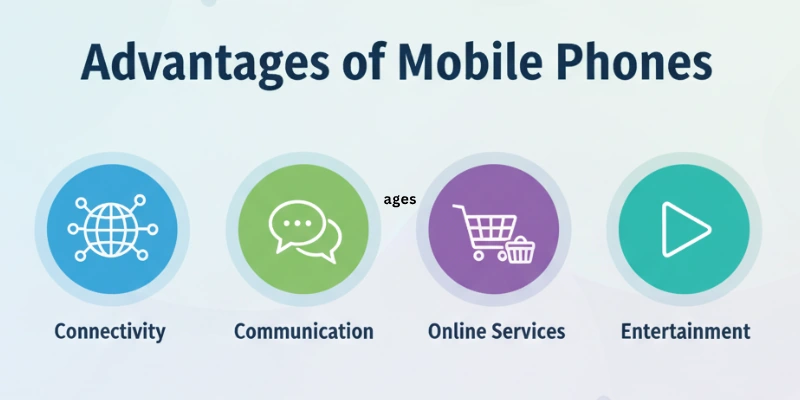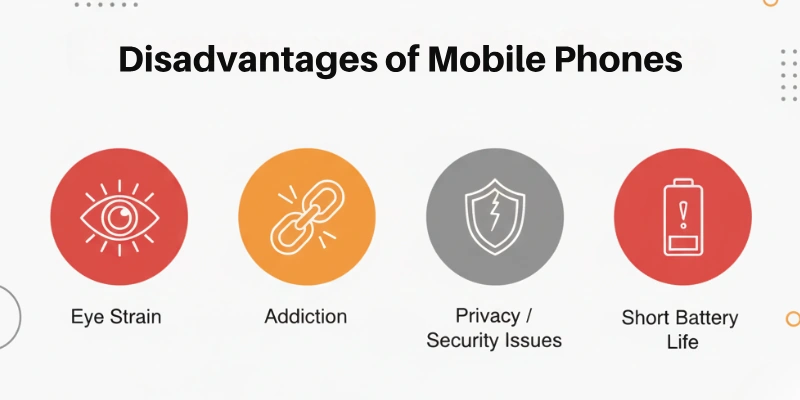Pros and Cons of Using Mobile Phones
Published: 10 Sep 2025
A mobile phone, also commonly known as a cell phone, mobile, or just a phone. It is a portable electronic device used for communication. It’s like having a mini-computer in your pocket!
These devices have become an essential part of our daily lives because we can make calls, send text messages, and stay connected with friends and family at any time and from any place.
So, whether you call it a mobile phone, cell phone, or just a phone, it’s a fantastic gadget that keeps us connected and entertained wherever we go!
But, as you know, technology comes with a lot of pros and cons. So in the upcoming sections of this blog post, we are also going to take a complete overview of the advantages and disadvantages of mobile phones.
Advantages of Mobile Phones
In today’s era, you won’t find anyone who doesn’t have a mobile phone. And there’s no doubt that mobile phones have brought about significant changes in our lives. This all means that there are a lot of mobile phone pros that we can’t even imagine.

So, here is the list of all the main advantages of cell phones:
- Communication
- Instant Messaging
- Internet Access
- Global Connectivity
- Social Networking
- Navigation
- Entertainment
- Photography
- Time Management
- Educational Apps
- Emergency Assistance
- Mobile Banking
- Remote Work
- Health Tracking
- Language Translation
- Shopping Convenience
- Document Scanning
- Note-Taking
- Weather Updates
- Alarm and Reminder Systems
Let’s cover each benefit of mobile phone.
Communication
The biggest benefit of mobile phones is communication. You can call or video chat with anyone, anytime, no matter where you are. For families, it means staying in touch even if they live far away. For businesses, it helps people save time by handling work calls instantly. Even simple text messages can brighten up someone’s day when they receive them at the right moment. In short, mobile phones make sure we are never really alone.
Instant Messaging
Messaging apps like WhatsApp, Messenger, and Telegram have changed how we talk. Instead of waiting for emails, we can send quick messages in seconds. You can share pictures, videos, voice notes, and even stickers to express yourself better. Group chats make it easy to plan events with friends or discuss work with teammates. The personal touch of instant messaging often feels warmer than a formal call or email.
Internet Access
One of the greatest powers of a smartphone is internet access. With a mobile phone, the entire world’s knowledge is at your fingertips. You can search anything, learn new skills, or stay updated with news while sitting on your couch. It’s like carrying a small library with you all the time. Whether for school, work, or fun, the internet on mobile phones keeps life more exciting.
Global Connectivity
A mobile phone makes the world feel small. With just one tap, you can talk to someone living on the other side of the globe. Businesses run smoothly because employees can connect with international clients instantly. Social platforms also make it possible to learn about different cultures and traditions. For families with loved ones abroad, global connectivity is a blessing.
Social Networking
Most of us check apps like Instagram, Facebook, or Twitter daily—and that’s the power of social networking. Phones make it easy to share life updates, post photos, and interact with friends. These platforms help people build communities with common interests. Sometimes, a single post can inspire or motivate hundreds of others. Mobile phones bring us closer to people we may never meet in real life.
Navigation
Have you ever been lost in an unfamiliar place? GPS on mobile phones solves that problem. With apps like Google Maps, you can find the fastest route, nearby restaurants, or even petrol stations. Navigation makes travel smoother and stress-free. For drivers, bikers, and even walkers, it saves both time and energy. Honestly, most of us can’t imagine going on a trip without it now.
Entertainment
Whenever we’re bored, our phones come to the rescue. Whether it’s streaming music, watching movies, or playing games, entertainment is just a click away. Mobile phones also allow us to read eBooks or listen to podcasts while traveling. High-quality displays and speakers make the experience even better. It’s like having a TV, a music player, and a gaming console all in one.
Photography
Gone are the days when we needed a separate camera. Mobile phones now come with powerful lenses that capture memories beautifully. You can click photos, shoot videos, and even edit them instantly. Sharing those memories with family and friends on social media makes it even more fun. For many people, their phone camera has become their favorite way to document life.
Time Management
Phones help us stay organized. With calendars, reminders, and to-do list apps, managing daily tasks becomes much easier. They send alerts before meetings, birthdays, or deadlines so nothing is missed. It’s like having a personal assistant in your pocket. Many people rely on these tools to balance work, family, and personal life.
Educational Apps
Mobile phones have opened new doors for learning. There are apps for learning languages, coding, science, or even cooking. Students can access eBooks and audiobooks anytime. Interactive lessons make studying fun and easier to understand. Even adults can continue learning new skills without attending physical classes. Education has truly become more flexible thanks to mobile phones.
Emergency Assistance
One of the most important benefits of a mobile phone is safety. In case of an accident, fire, or any emergency, you can call for help immediately. Phones can also share your live location, which is useful for rescue services. Having emergency contacts saved ensures instant access when needed. This feature alone has saved countless lives.
Mobile Banking
Banking has become so simple with mobile phones. You can check balances, transfer money, or pay bills without going to a bank. Most apps even use fingerprint or face ID for extra security. Mobile payments in stores save time and effort. It’s fast, convenient, and reduces the need to carry cash.
Remote Work
Mobile phones make working from anywhere possible. You can read and reply to emails, join video meetings, and manage projects while traveling. Apps for document editing and collaboration have made remote work smooth. For many people, this flexibility improves their work-life balance. Phones have become a must-have tool for modern professionals.
Health Tracking
Staying fit has become easier with health apps on mobile phones. They count your steps, track your calories, and even monitor your sleep. Many phones also connect with smartwatches for deeper health insights. It motivates users to stay active and meet their fitness goals. For people with health conditions, these apps can even track vital signs.
Language Translation
Traveling abroad is less stressful thanks to translation apps. You can translate words, phrases, or even entire conversations instantly. It helps you order food, ask for directions, or simply connect with locals. For students and professionals, it’s also a handy learning tool. Language barriers are no longer a big challenge when you have a smartphone.
Shopping Convenience
Online shopping is one of the biggest trends today, and mobile phones make it simple. With apps like Amazon or eBay, you can buy almost anything from home. Price comparison tools help you find the best deals. Plus, secure payment options make transactions safe. Shopping has never been this easy.
Document Scanning
No need for a bulky scanner anymore—your phone camera can do the job. With scanning apps, you can save documents as PDFs and share them instantly. It’s useful for students, professionals, and even for personal records. Everything stays digital, safe, and easy to access later.
Note-Taking
Phones are perfect for capturing quick ideas. You can jot down notes, save reminders, or even record voice memos. These apps sync across devices so your notes are always with you. Organized notes make it easier to stay productive. For creative people, it’s like carrying a digital notebook everywhere.
Weather Updates
Want to know if it’s going to rain today? Your mobile phone will tell you. Weather apps provide real-time forecasts and alerts. This helps with planning trips, outdoor activities, or even daily commutes. Staying updated on weather conditions ensures you’re always prepared.
Alarm and Reminder Systems
Finally, mobile phones replace traditional alarm clocks. You can set alarms for waking up, reminders for medicines, or alerts for important tasks. Repeating alarms help build daily habits. These features improve both productivity and time management.
Disadvantages of Mobile Phones
Just like advantages, mobile phones also come with downsides. Let’s look at the main disadvantages:

- Health Issues
- Distraction
- Addiction
- Privacy Concerns
- Security Risks
- Social Isolation
- Disruption of Sleep Patterns
- Dependency
- Cost
- Texting and Driving Risks
- Shorter Attention Spans
Let’s cover each drawback of mobile phones.
Health Issues
Spending long hours on a phone often leads to health problems. Many people complain of headaches, neck pain, or eye strain due to screen use. The blue light from screens can disturb your sleep cycle. Poor posture while using phones can cause back and shoulder problems. Over time, these habits may have serious effects on your health.
Distraction
Mobile phones are powerful, but they can also be distracting. Constant notifications, buzzing, and app alerts take our focus away from work or studies. Even during conversations, people sometimes check their phones, which feels rude. This distraction reduces productivity and weakens our ability to stay present. It’s important to control phone use to stay focused.
Addiction
It’s easy to get addicted to mobile phones, especially with social media and games. Many people feel restless if they don’t check their phones every few minutes. This addiction can harm relationships, reduce physical activity, and even affect mental health. The fear of missing out (FOMO) makes it worse. Learning to balance phone use is necessary for a healthy lifestyle.
Privacy Concerns
Mobile phones store a lot of personal data. From contacts and photos to banking details, everything is inside one device. Apps sometimes request unnecessary access, which may risk your privacy. Hackers can misuse this information if security is weak. Being careful with app permissions and settings is very important.
Security Risks
Phones can be targets for viruses, scams, and hacking attempts. Downloading untrusted apps or clicking suspicious links can expose personal data. Many people lose money or private information this way. Cybercriminals are becoming smarter, so users must also stay alert. Security apps and regular updates can reduce these risks.
Social Isolation
Ironically, while phones connect us online, they sometimes separate us in real life. People often choose chatting online over meeting friends in person. This creates feelings of loneliness and weakens social skills. Too much screen time also reduces the quality of family interactions. Balance is the key to avoiding this problem.
Disruption of Sleep Patterns
Using phones late at night is a habit for many, but it damages sleep quality. The blue light delays sleep and makes it harder to rest properly. Notifications in the middle of the night disturb deep sleep cycles. Over time, this can cause fatigue, stress, and other health issues. Keeping phones away before bedtime helps improve sleep.
Dependency
Many people feel helpless without their phones. Simple tasks like remembering numbers, reading maps, or writing notes now depend on smartphones. This over-reliance reduces creativity and problem-solving skills. Phones are tools, but life should not completely revolve around them. Developing offline skills is equally important.
Cost
Mobile phones are expensive, especially high-end models. Apart from the initial cost, apps, subscriptions, and accessories add up. Regular upgrades every year also put financial pressure. Repairing damaged parts can also be costly. This makes mobile phones a big investment for most families.
Texting and Driving Risks
One of the most dangerous problems is texting while driving. Even a second of distraction on the road can cause accidents. Many laws now strictly ban using phones while driving. Despite this, some people continue the risky habit. Staying responsible is crucial for safety.
Shorter Attention Spans
Phones make us used to quick scrolling and short content. This reduces our ability to focus on one task for a long time. Students may find it harder to concentrate on studies, and professionals may struggle with deep work. Short attention spans affect both productivity and learning. Training ourselves to take breaks from screens is very important.
Conclusion
In this guide, we have covered all the advantages and disadvantages of mobile phones in detail. These devices have changed our lives in many positive ways, but they also bring challenges that we should not ignore.
The best approach is to use mobile phones wisely—enjoy the benefits for learning, connection, and convenience while avoiding overuse, distraction, and health risks. A balanced lifestyle will help you get the most out of your phone without letting it control you.
That’s all for today’s guide. Thanks for reading, and goodbye!
FAQs
Here are the most frequently asked questions related to pros and cons of using mobile phons:
The main benefits are easy communication, internet access, social networking, and entertainment. Mobile phones also help with navigation, online shopping, and even health tracking. They make life faster and more convenient. For many people, mobile phones feel like a personal assistant in their pocket.
Yes, too much mobile phone use can cause eye strain, neck pain, and disturbed sleep. The blue light from screens affects our natural sleep cycle. Using phones while sitting in the wrong posture can also cause long-term problems. Taking regular breaks and limiting screen time helps reduce these risks.
Phones are addictive because of social media, games, and constant notifications. Many people feel the fear of missing out (FOMO) and keep checking their devices again and again. This habit slowly becomes difficult to control. Setting time limits and using apps mindfully can prevent addiction.
For students, mobile phones are both helpful and distracting. On one side, they provide access to educational apps, online learning, and research material. On the other side, overuse for gaming or social media can reduce focus on studies. Students should learn to balance phone use for both fun and learning.
Mobile phones can be safe for children if used in moderation and under supervision. They can help kids learn, stay connected with parents, and even improve knowledge. But unlimited access may expose them to harmful content or addiction. Parents should set boundaries and use parental control features.
Mobile phones connect people globally but sometimes reduce face-to-face interactions. Many prefer chatting online instead of meeting in person. This can create a feeling of isolation. Using phones wisely can keep both online and offline relationships healthy.
The best way is to enjoy the benefits while avoiding overuse. Limit screen time before bed, avoid phones while driving, and take breaks during the day. Use them as a tool, not as a habit. A balanced approach keeps mobile phones helpful without harming health or relationships.

- Be Respectful
- Stay Relevant
- Stay Positive
- True Feedback
- Encourage Discussion
- Avoid Spamming
- No Fake News
- Don't Copy-Paste
- No Personal Attacks

- Be Respectful
- Stay Relevant
- Stay Positive
- True Feedback
- Encourage Discussion
- Avoid Spamming
- No Fake News
- Don't Copy-Paste
- No Personal Attacks





